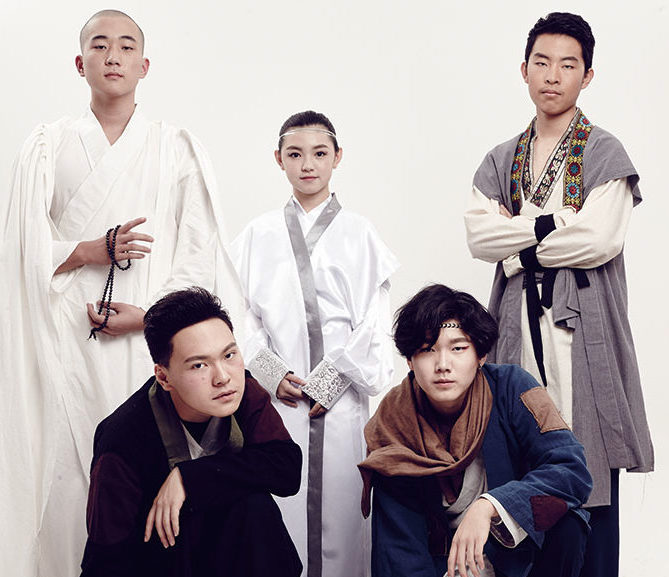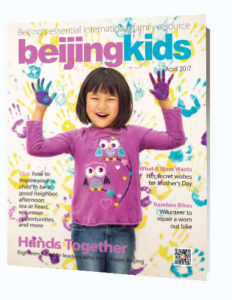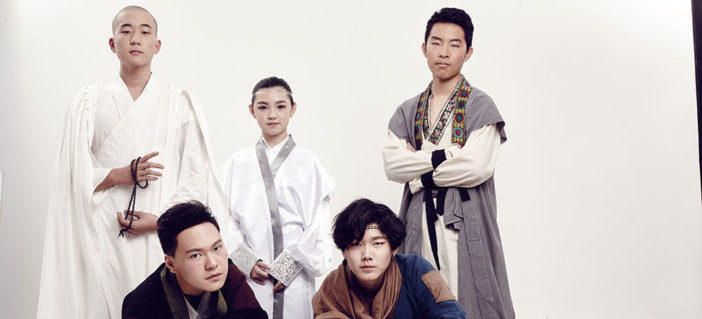We reached out to schools in Beijing to ask who was making an impact on their school communities. Our terms were loose, as we were curious about individuals who made a difference in leadership, community, and charity. We don’t feel like someone necessarily has to contribute to charity to be a community star, as sometimes a great, reliable friend in a school community can make just as much of an impact. Each of these stories is special, and we’re so proud to have had the chance to talk with these students and teachers.
Alex and Betty, Year 10 Students at Keystone Academy
One of Keystone Academy’s foundations is valuing and expressing Chinese culture. Perhaps to some, that might not seem hard to do, as the school is situated in the capital of the country. But in fact, elements of traditional Chinese culture in Beijing erode or change with each hutong that’s brought down and mall that springs up. Though modernization isn’t necessarily negative, even foreign parents typically desire that children have a strong understanding of their own root culture and family.

Alex (top left) is nominated for writing, directing, and organizing a student-led Chinese language drama at Keystone Academy. He poses with other members of the Wu Kong cast.
That’s why when Mrs. Pai suggested that students take on the project of producing a play about Wu Kong in Chinese, Alex and Betty were excited about the opportunity. “It took me three months to construct the script from the biography,” Alex said. “When we told other students about what we were doing, they were so excited. Wu Kong is the Monkey King, who is a childhood hero of most Chinese kids.”
“We also think it’s a great way to show foreign teachers and students important aspects of Chinese culture,” Alex added. But this play was about more than just culture. Alex explained: “We’re not children anymore, and through this play we put forth our thoughts about life, this world, and the characteristics of humans. The five main characters in the play explore five basic principles: freedom, love, loyalty, belief, and empathy.”
They thought carefully about the emotions expressed by each character. They both stressed the necessity of the audience grasping these emotions to understand the crux of the drama. But this necessity became a source of conflict in leading and organizing the drama.
“In reflection of planning for this play, I saw that I was angry and quite stubborn,” Alex said.
“In one specific situation, one actor and I argued for nearly three months about the emotion of one specific character. We saw that this was inefficient. Finally we had a compromise that I would direct the final emotion of the characters, but that they would have control over the management of the stage, where the actors would stand on stage during the play.”
“We needed to collaborate,” Betty said, “and for me, I learned that my weakness was being too emotional. I needed to be very organized to get the stage in the way it should be, but sometimes I was frustrated when actors didn’t take rehearsals seriously. So I encouraged them to pretend that the audience is always watching.”
Betty told them, “Maybe we are not professionals, but at least we can have a professional attitude. We should pretend that every time we’re on the stage at all times.”
But their professional attitude is apparent. “I cut my hair to look like a monk so that the feeling was clear,” Alex said. “It was longer and curlier. In film, someone could put on stage makeup and it would look fine, but that won’t look real on stage. So I cut it to express the right feeling.”
Though there was excitement and dedication, since this was a student-led drama, they still had to handle unexpected issues. “At the last minute, soldiers suddenly said they had to drop out because of math exams, so I had to go from one dorm room to the next to try and find replacements,” Alex said.
Of course, though they organized and encouraged others in their roles, they wanted to add they couldn’t have done this alone. “Both Ms. Pai and Ms. Lee helped us so much, especially in analyzing Wu Kong’s biography, and it was a group of us, about four other students, who really took on this project to organize the drama,” Alex said.
Betty added, “They gave us the right spirit to never give up and to continue even when were having difficulties.”
Readers can see this drama at Keystone on April 21-22 at 6.30pm. RMB 50 (adults), RMB 20 (children 12 and under). Visit www.keystoneacademy.cn to purchase tickets.
Photo: Courtesy of Keystone Academy

Download the digital copy here.




